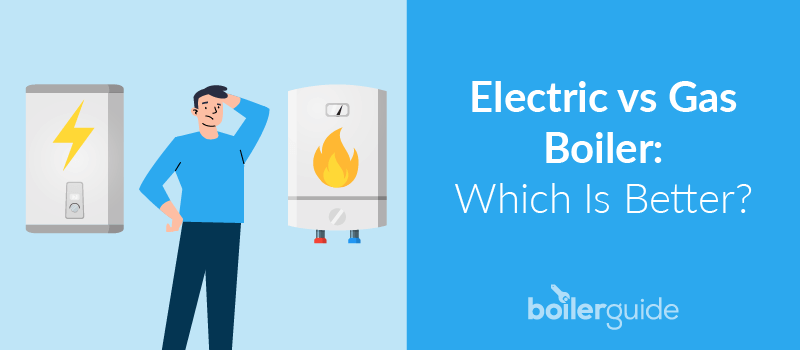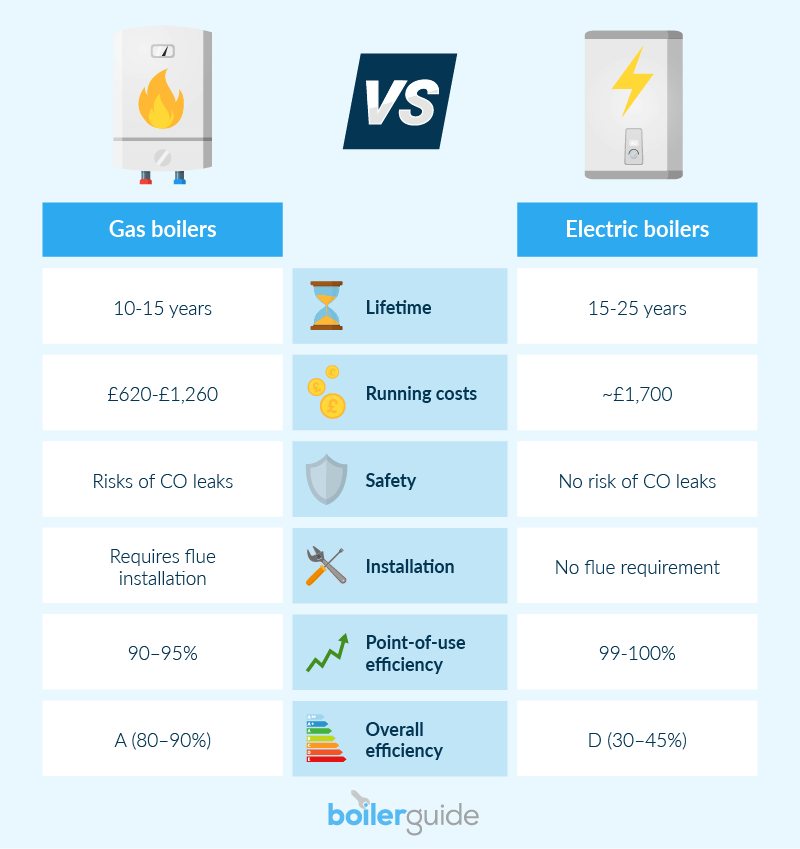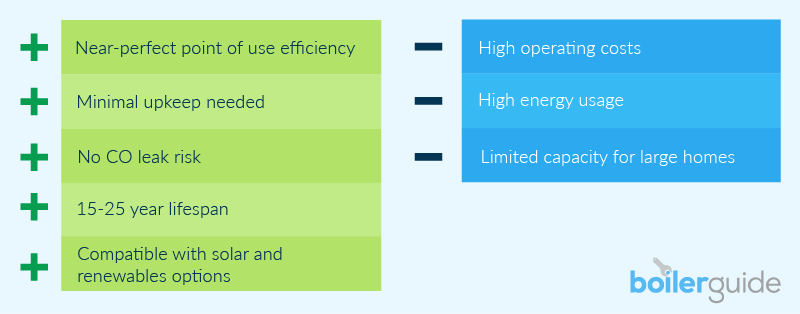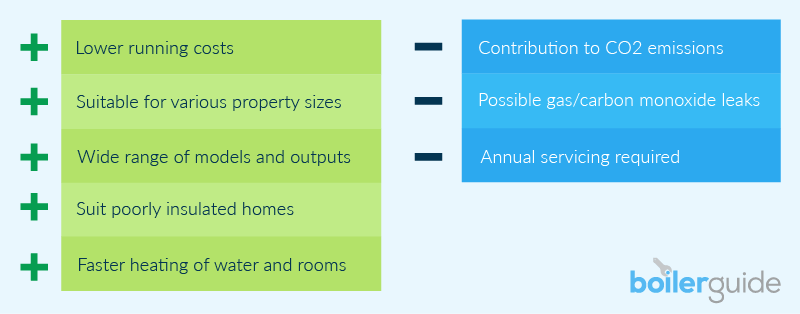Electric Boilers vs. Gas Boilers: Pros, Cons & Costs (2025)
- Electric boilers best suit 1 bed, 1 bathroom properties, while gas boilers can efficiently and cost-effectively heat homes with multiple bedrooms and high hot water demand.
- Electric boilers typically cost £3,250 on average to install and £1,700 to run per year. Gas boilers cost an average of £3,450 but cost significantly less to run: £620-£1,260.
- Gas boilers are the most popular choice among UK homeowners, with 1.7 million gas units being installed and replaced annually.
An electric boiler can be a more efficient and environmentally friendly gas boiler alternative for your home. However, the electric boiler cost can add up when you consider that electricity from the grid is much more expensive than natural gas.
In this electric vs gas boiler comparison, we'll help you make an informed decision for your heating project. We’ll cover the installation and running costs, electric boiler vs gas boiler pros and cons as well as the main differences between them.
The only thing that is the same for any installation is the need for a trustworthy heating engineer. Yet finding one yourself can take days with all the quote research, calling up installers, and comparing their fees.
Our recent survey showed that 65% of homeowners were satisfied or very satisfied with the installers we found for them. So why don’t you save your valuable time and leave the quote search to Boiler Guide?
Just complete our 30-second questionnaire below, and we’ll provide you with up to 3 free, non-binding quotes within 48 hours. Click below to get started!
Get your best deal
Quickly compare 3 FREE quotes
- Next day installation
- Quotes from local engineers
- 1.9 million quotes in 10 years
- Save up to £975 in the 1st year
- Next day installation
- Quotes from local engineers
- 1.9 million quotes in 10 years
- Save up to £975 in the 1st year

1,8 million quotes provided in 10 years
Electric vs gas boilers: Main differences
It would be wrong to state that either boiler is better or worse. Both electric and gas boilers have their pros and cons; they are just different in the way they produce heat.
Gas boilers produce heat by burning natural gas, and electric boilers generate heat from electricity. Yet there are other aspects to factor in when doing the electric vs gas boiler comparison:
- Lifetime: Gas boilers are more prone to wear and tear as they have more moving parts compared to electric ones. Because of this, gas boilers last 10-15 years, compared to 15-25 years for electric boilers.
- Running costs: In the UK, gas is cheaper than electricity, which is reflected in gas vs electric boiler running costs. As of April 2025, the energy price cap for electricity is 27.03p per kilowatt hour (kWh) compared to 6.99p for gas.
- Safety: When not being properly maintained and regularly checked, gas boilers pose the risk of carbon monoxide (CO) leaks and poisoning, while electric boilers eliminate this particular risk. Yet, with the latter, there’s still a possibility of electrical shock or fire in case of faulty components or installation.
- Installation: Gas boilers require a gas supply and flue connection for installation, whereas electric boilers only need a mains power supply.
- Efficiency: On average, modern gas boilers achieve 90-95% efficiency, while electric boilers usually reach 99-100%. However, when considering their whole supply chain, electric boilers fall short in terms of efficiency, being only 30-45% efficient. More on this later.
Costs of electric and gas boilers in 2025
As of 2025, the average supply and installation cost for a gas boiler is £3,450 and £3,250 for an electric one. Your household size and water demand play an important role in the new boiler cost calculation:
| Cost of electric and gas boilers overview | |||
| Household size | Gas boiler cost (excl. installation) | Electric boiler cost (excl. installation) | Recommended output |
|---|---|---|---|
| Small (up to 10 radiators; annual consumption 7,312.5 kWh) | £600-£1,700 | £500-£3,050 | Gas: 18-27kW
Electric: 9-12kW |
| Medium (10-15 radiators; annual consumption 11,212.5 kWh) | £775-£1,250 | £600-£3,300 | Gas: 28-34kW
Electric: 12-15kW |
| Large (15-20 radiators; annual consumption 16,575 kWh) | £860-£3,300 | £1,795-£3,000* | Gas: 35-42kW+
Electric: 15kW+ |
The electric boiler vs gas boiler supply price difference isn’t drastic, but can elevate during installation.
This is all because gas boilers require complex installation procedures, like flues (£200-£700) and gas piping (£250-£400), whereas electric boiler installations typically involve only electrical connections.
However, in the case of high-capacity electric boiler installations, major electrical upgrades are needed, such as switching from a traditional single-phase to an advanced three-phase power supply. Such a switch typically costs anywhere from £3,000 to £8,000, so it’s pretty uncommon for residential heating projects.
Add to this a day of an installer’s work, which typically costs £300-£500, with potential additional costs for various fuel and boiler types.
As you see, gas boilers are represented by larger size outputs, and you can easily find an efficient boiler for a 4 bed house or a powerful boiler for a 5 bed house.
Electric boilers, in turn, will suffice for heating small properties with 1 bedroom and 1 bathroom. Larger properties will see higher energy bills which might discourage some homeowners from purchasing an electric boiler. Let’s look at the running costs of electric and gas boilers in more detail.
Electric boiler vs gas boiler running costs
Electric boilers are more expensive to run than gas boilers. On average, a year of running an A-rated condensing gas boiler costs between £620 and £1,260. Yet it is less expensive than running an electric boiler, which costs around £1,700 yearly.
| Electric boiler vs gas boiler running costs | ||
| Metric | Electric boiler | Gas boiler |
|---|---|---|
| Cost per kWh* | 27.03p | 6.99p |
| Annual running cost** | £1,700 | £890 |
| Monthly cost** | £286 | £75 |
| Maintenance cost | No annual servicing | £60-£110/year |
Do you want to replace a gas boiler with an electric one, but the potential running costs scare you away? Discuss your options with a heating engineer then. They could inform you of the possible renewable energy pairings, the cost-saving tariffs available and the best boilers for your situation.
Speaking of such a long-term investment, it’s highly recommended to work only with trustworthy professionals. Yet how do you find one without spending hours on review platforms, calling the installers on your own and comparing their prices? It’s simple: request up to 3 free quotes through Boiler Guide.
Just fill in our 30-second form, and within 48 hours, we’ll connect you with the best heating professionals near you. Click below to receive up to 3 free and non-binding quotes.
Get your best deal
Quickly compare 3 FREE quotes
- Next day installation
- Quotes from local engineers
- 1.9 million quotes in 10 years
- Save up to £975 in the 1st year
- Next day installation
- Quotes from local engineers
- 1.9 million quotes in 10 years
- Save up to £975 in the 1st year

1,8 million quotes provided in 10 years
Efficiency of electric and gas boilers
Gas boilers are usually 90-95% efficient, while electric boilers are known for their near-perfect, 99-100% efficiency. Yet when considering the whole supply chain of both boilers, their overall efficiency is somewhat lower.
| Electric boiler v gas boiler efficiency | ||
| Factor | Gas boilers | Electric boilers |
|---|---|---|
| Energy source journey | Natural gas is piped directly to homes | Electricity is converted from fossil fuel into power, then transmitted to homes through the grid system |
| Generation efficiency | 90-95% | 30-50% |
| Transmission losses | 1-2% (gas pipeline losses) | 7-12% (electricity grid losses) |
| Carbon intensity | 0.216 kg CO?/kWh | 0.519 kg CO?/kWh |
| Fuel factor penalty* | 1.00 (baseline) | 1.55 |
| Point-of-use efficiency | (90-95%) | (99-100%) |
| Overall systemic efficiency | A (80-90%) | D (30-45%) |
Electric boilers are praised for being 100% efficient, but why do they receive low ErP ratings (usually D)? It’s important to understand that their 100% efficiency refers to the point-of-use efficiency. In other words, electric boilers convert all of the electrical energy they use into heat.
However, a lot of the original energy is lost throughout its overall supply chain: 50-70% during the electricity generation, 2-5% during transmission and 5-10% during distribution.
Gas, in turn, doesn’t need to be generated. It’s extracted from the ground and processed, resulting in only 5-10% of energy losses. During distribution and operation, another 1-2% and 5-10% are lost, respectively. This is why, while being less energy efficient at the point of use, gas boilers score higher systemic efficiency ratings.
Apart from electric boiler vs gas boiler running costs, as well as their installation prices and overall efficiency, there are other differences to consider, such as their pros and cons.
Pros and cons of electric boilers
Electric boilers come with a number of advantages, such as:
- Near-perfect energy efficiency: As discussed above, electric boilers show 99-100% efficiency at the point of use, which means they transform all electrical energy into heat during their use.
- Minimal upkeep needed: With fewer moving parts, electric boilers are less prone to mechanical failures. Yet it’s highly recommended to schedule checkups every two years to ensure optimal performance.
- No carbon monoxide risk: With electric heating, you don’t need to worry about potential leaks of carbon monoxide, as these boilers don’t produce it.
- 15-25 year lifespan: Due to a lighter design and fewer moving parts, electric boilers are more durable than gas ones.
- Compatible with solar and renewable options: Depending on your home’s configuration, electric boilers can be paired with solar panels or heat pumps. This can significantly reduce your energy bills and carbon footprint.
And there are a couple of heavy-weight disadvantages electric boilers bring along:
- High operating costs: Gas costs 3 times less than electricity: 6.99p for gas and 27.03p for electricity. This way, you would pay around £1,700 for electric boiler running costs vs gas, which will cost you an average of £890 per year.
- High energy usage: An average 10kW electric boiler needs 45 amps of electricity, which makes almost half of the 100-amp household capacity. This limits the simultaneous use of various electricity-dependent appliances.
- Limited capacity for large homes: Due to high running costs, homeowners of large dwellings in the UK opt for gas boilers. This reflects on the market proposition, and electric boilers usually top out at around 15kW while gas boilers range from 20kW to 40kW.
Pros and cons of gas boilers
- Lower running costs: Despite higher installation costs, gas boilers are cheaper to run as the cost of gas is significantly lower than electricity. This contributes to higher cost-effectiveness and faster return on investment.
- Suitable for various property sizes: Gas boilers come in a wide range of outputs, from 11kW to 40kW, meaning that they cater to the needs of both small and large properties.
- Wide range of models and outputs: Various brands continuously work on upgrading their gas boiler range, which allows homeowners to choose a model that suits their heating needs.
- Suit poorly insulated homes: Gas boilers can deliver hot water in seconds, which allows for quick heat loss compensation and home comfort preservation.
- Faster heating of water and rooms: Due to their higher power output and direct combustion process, gas boilers heat water and space faster. This is especially beneficial for properties with several bathrooms and high hot water usage.
However, there are a couple of disadvantages to gas boilers.
- Contribution to CO2 emissions: Gas boilers are usually 90-95% efficient, which means 5 to 10% of the energy is lost during operation as heat in the flue gases. This contributes to greenhouse gas emissions and global warming.
- Possible gas/carbon monoxide leaks: In case of improper maintenance or incomplete combustion, gas boilers pose a risk of gas or carbon monoxide (CO) leaks. These can be deadly, so carbon monoxide detectors near your boiler are required.
- Annual servicing required: Yearly checks by a Gas Safe engineer are required to ensure home occupants’ safety, the boiler’s efficient operation and its longer lifespan.
If you smell gas, it might be a sign of a leak, which can have fatal consequences. In such cases, immediately call the National Gas Emergency Service number: 0800 111 999.
Electric or gas boilers: which is the best boiler for you?
Are you still on the fence regarding which boiler to choose? That’s completely normal with so much information to take into account. Don’t waste more time researching, rather talk to a qualified installer to find a heating option that suits your particular needs.
A certified heating engineer will assess your home and recommend whether you need a gas or electric boiler, define any necessary upgrades as well as calculate the projected costs. However, finding such a professional near you is a daunting task which can drag on for days. Doesn't sound that exciting, does it?
How about getting up to 3 boiler quotes within 48 hours with Boiler Guide’s help? Simply complete our short form below, and we will connect you with local installers we have thoroughly vetted so that you don’t have to.
Click below to get your quotes.
Get your best deal
Quickly compare 3 FREE quotes
- Next day installation
- Quotes from local engineers
- 1.9 million quotes in 10 years
- Save up to £975 in the 1st year
- Next day installation
- Quotes from local engineers
- 1.9 million quotes in 10 years
- Save up to £975 in the 1st year

1,8 million quotes provided in 10 years
FAQ
What are the costs to replace gas boilers with electric boilers?
It’s hard to answer this question as each house is different. On average, an electric boiler unit costs £3,250 to install. However, significant electrical upgrades are needed, which might cost between £3,000-£8,000.
Is it worth replacing a gas boiler with an electric boiler?
If you’re an eco-conscious homeowner, then replacing a gas boiler with an electric one is worth it, as electric boilers turn 100% of energy into heat. Yet, they are 3 times more expensive to run than gas boilers, so from an economic point of view, they might not suit every budget.
Which is cheaper to run, a gas or an electric boiler?
Gas boilers are cheaper to run than electric ones. For an average 2-bedroom house, the running costs for gas and electric boilers are £890 and £1,700 respectively.







